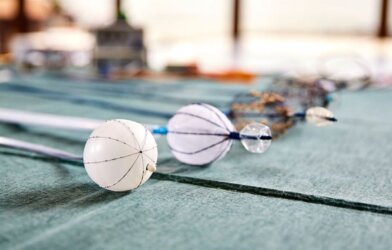BALTIMORE, Md. — Could shocking your doctor’s brain help them use high-tech robots during surgery? A new study is revealing how electrical brain stimulation could potentially cut the time it takes doctors to learn new surgery techniques in half.
In the study, doctors who initially trained with robotic surgery tools in virtual reality (VR) demonstrated improved performance after receiving brain stimulation compared to those who did not receive this electrical nudge. This intriguing research indicates that stimulating specific brain areas could aid healthcare professionals in transferring skills learned in VR settings to actual operating rooms.
The study, conducted by Johns Hopkins researchers, highlights the possible advantages of brain stimulation in the medical field. Participants had to maneuver a surgical needle through three small holes, first in a virtual simulation and then in a real-life setting using the da Vinci Research Kit, an open-source research robot. These exercises simulated the complex maneuvers doctors perform during abdominal surgeries.
During the task, the participants, who had no prior training in surgery or robotics, received a mild electric current through pads on their scalps, targeting the cerebellum. Half of the participants received a constant electric current throughout the test, while the other half only received brief stimulation at the start, with no further stimulation for the remainder of the test. The researchers found that those who received continuous electric currents throughout the test showed a significant improvement in dexterity and overall performance.
“The group that didn’t receive stimulation struggled a bit more to apply the skills they learned in virtual reality to the actual robot, especially the most complex moves involving quick motions,” says Guido Caccianiga, a former Johns Hopkins roboticist, now at Max Planck Institute for Intelligent Systems, who designed and led the experiments, in a media release. “The groups that received brain stimulation were better at those tasks.”

Non-invasive brain stimulation can influence specific brain regions from outside the body. Previous research has demonstrated the benefits of such stimulation, particularly in motor learning for rehabilitation therapy. However, the current work by the Johns Hopkins team elevates this research by exploring how brain stimulation can assist surgeons in acquiring skills crucial for serious, real-world scenarios.
“Training in virtual reality is not the same as training in a real setting, and we’ve shown with previous research that it can be difficult to transfer a skill learned in a simulation into the real world,” says Jeremy Brown, the John C. Malone Associate Professor of Mechanical Engineering. “It’s very hard to claim statistical exactness, but we concluded people in the study were able to transfer skills from virtual reality to the real world much more easily when they had this stimulation.”
“It was really cool that we were actually able to influence behavior using this setup, where we could really quantify every little aspect of people’s movements, deviations, and errors,” adds co-author Gabriela Cantarero, a former assistant professor of physical medicine and rehabilitation at Johns Hopkins.
Robotic surgery systems offer significant advantages for clinicians by augmenting human skills. These systems aid surgeons in reducing hand tremors and executing precise tasks with improved vision.
Beyond impacting how future surgeons might acquire new skills, this type of brain stimulation could also have implications in various industries that rely on VR training. The researchers propose that brain stimulation could enhance our general learning abilities, extending beyond the realm of VR training.
“What if we could show that with brain stimulation you can learn new skills in half the time?” Caccianiga concludes. “That’s a huge margin on the costs because you’d be training people faster; you could save a lot of resources to train more surgeons or engineers who will deal with these technologies frequently in the future.”
The results are published in the journal Scientific Reports.
You might also be interested in:
- World’s first baby born from transplanted uterus removed and implanted using robot surgery
- Zap while you nap: Brain stimulation during sleep turbo charges memory
- Wireless acoustic devices listen to our bodies better than doctors
South West News Service writer James Gamble contributed to this report.




